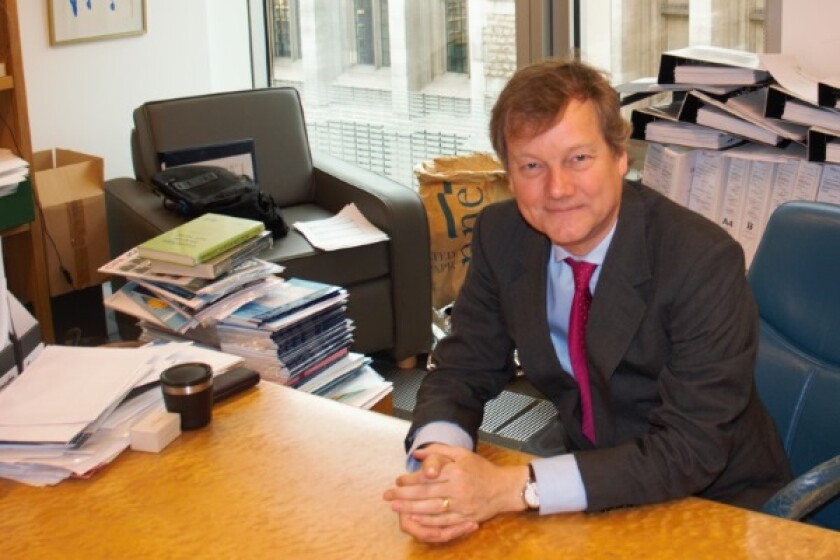Half-year data reveals Western District of Texas’s rise to top
Another noteworthy finding from the data was that filings remained relatively steady in most courts, apart from the District Court for the Eastern District of Texas, where cases actually went up for the first time since 2015. This data suggests that COVID-19 did not stop companies from conducting business as usual.
Other Managing IP stories from this week include:
· Why tech patent owners flock to Barcelona’s courts
· ‘I surrender’: luxury brands on Turkish IP enforcement woes
· Fraudulent ads report highlights partnership and policy needs
· Canadian cannabis brands blunt about trademark challenges
Colin Birss promoted to England and Wales Court of Appeal
The soon-to-be lord justice, who in 2017 ruled at the England and Wales High Court that global licences could be fair, reasonable and non-discriminatory, was approved by the Queen alongside seven other justices, including Mr Justice Christopher Nugee, who occasionally sits in the Patents Court.
Birss was called to the Bar (Middle Temple) in 1990 and took silk in 2008. He was appointed as a specialist circuit judge of the Patents County Court (now called the IPEC) in 2010 and a High Court judge in the Chancery Division in 2013.
His promotion probably comes as a bitter-sweet moment for patent counsel in the UK. While the Court of Appeal now has several experienced patent judges, including Lord Justice Richard Arnold, who was elevated to the appeals court last year, the High Court has been left with comparatively very few.
Managing IP interviewed Birss at his office at the High Court in 2019.
Ex-Google engineer Anthony Levandowski gets 18 months for trade secret theft
Levandowski, who was accused of stealing an internal tracking document from Google related to its self-driving car programme, was also fined $95,000 and ordered to pay around $756,000 in damages to Waymo, the self-driving car unit of Google’s parent company Alphabet.
The ex-Google employee was also sentenced to a three-year period of supervised release.
Prior to this ruling, Levandowski faced a maximum sentence of 10 years in prison and a fine of $250,000, plus restitution, for each violation under Section 1832 of Title 85 in the US Code.
Upon sentencing Levandowski, Judge William Alsup said: “This is the biggest trade secret crime I have ever seen. This was not small. This was massive in scale.”
A date has yet to be set for when Levandowski will start serving his sentence, but a Department of Justice press release noted that the date would be determined once the risks from COVID-19 have subsided.
USPTO will raise PTAB and patent fees in October
As part of its biennial review, the office found that fee adjustments were necessary to adapt to increasing costs and to provide necessary resources for patent operations.
More recently, the USPTO considered the state of the US economy, the operational needs of the agency, and the comments and advice received from the public during the 60-day comment period in determining when to implement the final rule.
The USPTO was originally planning to implement the fee increases in August, but the effective date has been pushed back to October 2.
A full press release for the announcement can be accessed here.
Jaguar Land Rover loses trademark battle for Defender at High Court
The UKIPO had previously refused these trademark applications on the basis that the shapes lacked distinctiveness, and Jaguar Land Rover appealed the decision to the High Court.
Mrs Justice Melissa Clarke upheld the findings of the IP office that while differences in design may appear significant to some specialists, they “may be unimportant, or may not even register, with average consumers”.
This decision in Jaguar Land Rover v Ineos Industries will allow the Ineos Group to go ahead with designs for its Grenadier off-road vehicle.
Commenting on the outcome, BDB Pitmans partner Dennis Lee said: “Shape marks are notoriously difficult to register. Aside from the London Taxi and KitKat cases, the Rubik’s Cube shape mark application was another high-profile rejection.
“This has not deterred major brand owners from pursuing these non-traditional trademark rights in order to strengthen their protection, but ultimately they have at their disposal other forms of IP rights to protect an overall shape, be it iconic vehicles, chocolate bars or puzzle toys.”
Another fork in the Section 101 road: Federal Circuit split in American Axle en banc rehearing
The orders came in response to a joint petition filed by American Axle, in a case concerning patent eligibility law in the US.
The Federal Circuit also published a modified precedential opinion of its original 2019 opinion in American Axle v Neapco in light of this latest decision.
In its October 2019 ruling, the Federal Circuit followed the District Court for the District of Delaware’s finding that the asserted claims for a driveshaft patent were ineligible under Section 101 of Title 35 in the US Code. Only Judge Kimberly Moore dissented.
In the latest orders, however, the Federal Circuit judges were split down the middle. In the order denying rehearing en banc, Judges Moore, Pauline Newman, Kathleen O’Malley, Jimmie Reyna, Alan Lourie and Kara Farnandez Stoll dissented.
Managing IP will publish an analysis of this development next week.











